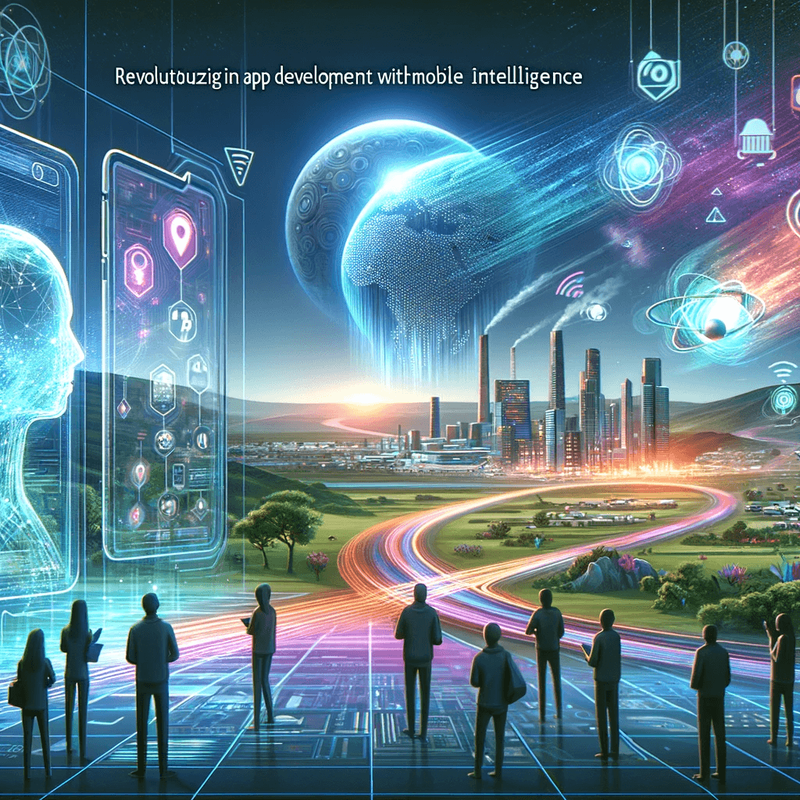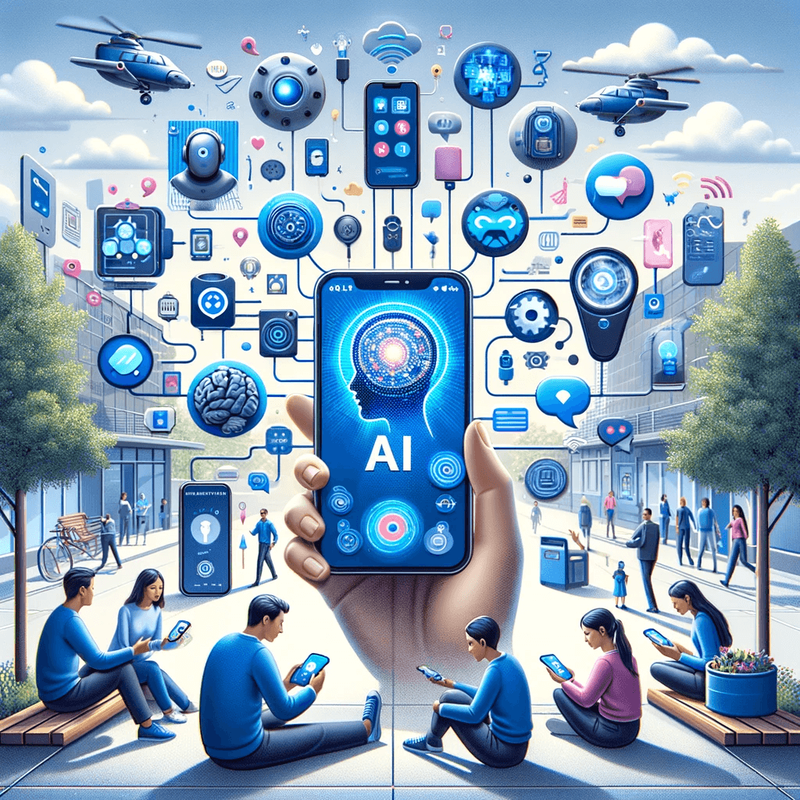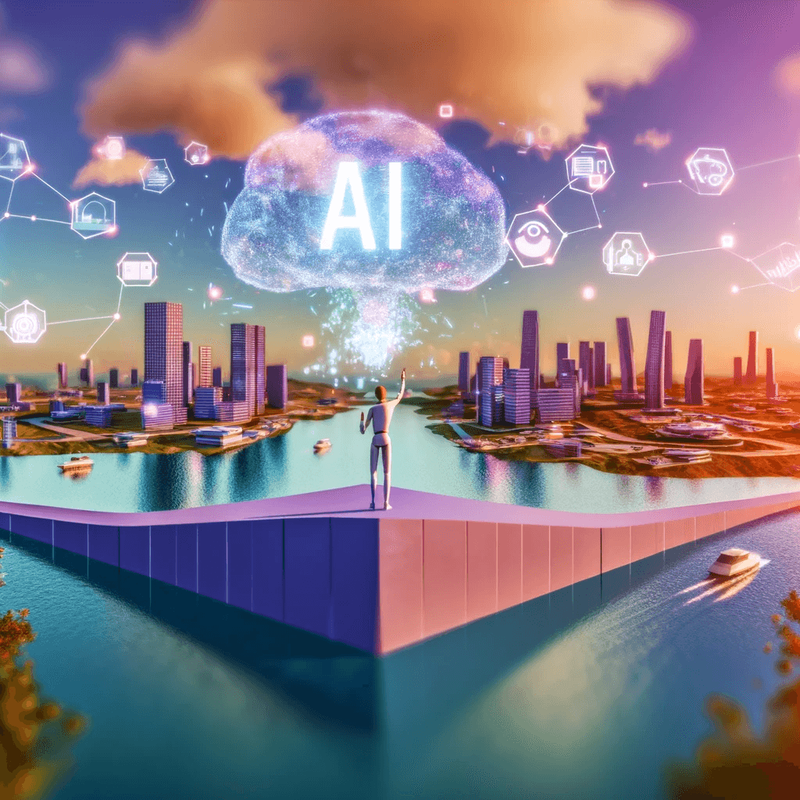App Development 2024: Unlock AI Potential
The digital landscape is evolving unexpectedly, and at the heart of this variation is the blending of artificial intelligence (AI) into mobile app development. As we approach 2024, combining AI with mobile packages is not just a craze, but a strategic technique that provides revolutionary solutions, streamlines operations, and beautifies personal experiences.
In this blog post, we take a deep dive into why artificial intelligence is gaining momentum in mobile app development, its benefits, top AI technology for apps, implementation guidelines, and the outlook for the future.

The growing popularity of artificial intelligence in developing mobile applications
In recent years, we have seen a remarkable increase in the adoption of AI technology in various sectors. The field of mobile application development is no exception. A strong push behind this trend is the call for more customized, greener, and smarter apps that can predict consumer behavior and make decisions in real-time.
Here's a quick overview of some of the reasons why implementing AI in app development is becoming increasingly popular.
- By the time we get to 2030, the global AI market is poised to jump to a fantastic $2 trillion, underscoring its extraordinary expansion despite its relatively recent appearance on the tech scene. (Statista)
- The AI market is heading in the right direction for a dramatic rise, skyrocketing from $8.56 billion in 2020 to a whopping $84.8 billion by 2030. This outstanding boom trajectory represents a compound annual growth rate (CAGR) of 26.4% from 2021 to 2030. (Allied Market Research)
One substantial issue contributing to this popularity is the improved functionality of mobile hardware to aid complex AI algorithms. Today's mobile phones are equipped with advanced processors and enough memory to run artificial intelligence models efficiently. In addition, cloud computing services have made it difficult for applications to process large data sets without straining device resources.
But what exactly makes incorporating artificial intelligence into mobile application developments so attractive? Let's explore.
Exploring the Surge of AI-Infused Apps in the Business World for 2024
As we look ahead to 2024, mixing AI (Artificial Intelligence) into mobile app development is poised to revolutionize the business landscape. Let's dive deeper into each component and find out more about how AI technologies are transforming several industries:
- Streamlining Business Operations for Greater ROI
Artificial intelligence technologies offer companies the opportunity to automate routine tasks, resulting in huge cost savings and greater efficiency. By implementing predictive retention using artificial intelligence, businesses can be aware of equipment failures before they happen, avoiding costly downtime and maximizing productivity. This generation uses system learning algorithms to analyze historical records and styles, enabling businesses to optimize maintenance schedules and allocate resources efficiently.
Additionally, AI-powered structures can embellish supply chain management by anticipating call patterns, optimizing inventory, and streamlining logistics. By automating these methods, companies can gain a higher return on investment (ROI) through advanced operational performance.
- Elevating Service Standards through Data Insights
The ability to explore a significant number of statistics is a major benefit that AI brings to businesses. By leveraging AI technology, organizations can tap into valuable insights into patron preferences and behavior patterns. This know-how enables them to adapt their products and services to meet individual demands more effectively.
For example, e-commerce systems can use artificial intelligence algorithms to analyze customer surfing records, purchasing patterns, and demographic statistics. With this knowledge, they can offer personalized product advice, focused promotions, and tailored shopping. This level of customization is now not the most effective complement to client delight, but in addition promotes accelerated income and patron loyalty.
- Amplifying User Engagement with Artificial Intelligence (AI) Innovations
AI-driven personalization has emerged as a key challenge for modern mobile applications. By studying the facts of people's behavior, apps can generate customized content based entirely on interactions outside of it. This customization phase creates a more engaging consumer experience by delivering actionable and well-timed listings.
Additionally, AI technologies allow applications to anticipate people's wishes and capabilities. For example, digital assistant apps can proactively suggest tasks, reminders, or advice based solely on the user's context and habits. This proactive technique not only complements user engagement but also fosters a deeper connection between the app and the consumer.
- The Intrigue of Neural Networks in Artificial Intelligence (AI)
Neural networks, inspired by the structure of the human brain, have proven to be a fascinating problem in AI technology. These networks are adept at pattern recognition and troubleshooting complex problems, making it worthwhile to perform duties including image reputation, speech popularity, and natural language processing.
In improving mobile applications, neural networks are revolutionizing capabilities such as image popularity. For example, apps can hire artificial intelligence algorithms to examine images and select objects or faces appropriately. The technology has extensive programs across industries, from clinical diagnostics to augmented reality reviews.
- Analyzing Patterns in User Behavior
One of the key strengths of artificial intelligence lies in its ability to identify patterns in large amounts of information. In the field of mobile applications, this feature allows corporations to leverage valuable insights into user behavior and choices.
When reading users' entertainment records, apps can spot trends and styles that won't be obvious to human observers. This perception can drive strategic selection and enable agencies to create more personalized and targeted offers. For example, a health app can use AI algorithms to research exercise styles and offer custom-suggested exercise plans based on characters' dreams.
- The Evolution of Conversational Interfaces
Chatbots and virtual assistants have changed the way customers interact with mobile apps. These conversational interfaces use (NLP) natural language processing algorithms to recognize and intelligently respond to people's questions or instructions.
With AI-powered chatbots incorporated into mobile apps, companies can provide instant support and offers 24/7 without the need for human intervention. This level of accessibility complements the consumer experience by providing concise answers and responses to questions or issues.
- Streamlining Decision-Making with Automated Reasoning
AI technology enables computational reasoning and enables organizations to streamline decision-making tactics. By leveraging predefined standards or reading beyond decisions, AI can automate common decision-making responsibilities, saving time and reducing the threat of human error.
In operations along with logistics or currency planning, AI-based structures can analyze large amounts of records and offer optimized solutions. For example, AI algorithms can optimize schedules for creating delivery rates or support financing strategies based entirely on ancient market statistics. These computer reasoning skills beautify efficiency and accuracy in important business operations.
- Enhancing Productivity in Routine Tasks
The ability of artificial intelligence to automate monotonous and repetitive tasks is a game-changer for organizations. By delegating these responsibilities to AI-powered structures, employees can gain awareness of larger strategic activities that add value to the business.
For example, AI virtual assistants can handle scheduling, statistics entry, or primary reader inquiries, freeing up staff time to focus on extra complicated and innovative duties. This change is now not the most skillful, it increases productivity, but in addition, improves the pleasure of the process and the usual working conditions.
The integration of artificial intelligence into improving mobile applications has become a catalyst for innovation and competitive advantage across industries as we approach 2024. These compelling reasons highlight the great potential of artificial intelligence in reengineering commercial enterprise operations and improving consumer studies.
For insights into the latest trends in mobile app development infused with AI technologies, explore this comprehensive guide.
Leading AI Technologies to Enhance Your Mobile Applications

The integration of artificial intelligence (AI) into mobile applications opens global opportunities for increased functionality and entertainment. Here are some top AI technologies that can redefine the mobile app landscape:
- Voice recognition systems: Thanks to advances in voice reputation, applications can now understand and interpret human speech with excellent accuracy. This feature is especially important for virtual assistants and hands-free controls, offering customers a seamless way to interact with their gadgets. Whether it's dictating messages, running commands, or searching, voice recognition systems have greatly improved the accessibility and convenience of mobile applications.
- Interactive chatbots: AI-powered chatbots are revolutionizing customer support and help in mobile applications. These smart bots can simulate human conversations, provide direct help to users, answer questions, and deliver personalized instructions. Chatbots have become an important feature in applications across industries, enabling businesses to provide 24/7 real-time customer support and beautify human engagement.
- Advanced Natural Language Processing (NLP): NLP is the backbone of chatbots and voice popularity frameworks, enabling applications to explore, decipher, recognize, and perceive human languages. This generation enables extra natural and contextual interactions between humans and machines. NLP algorithms process text or voice inputs to extract meaning, localize sentiments, perform language translations, and even generate customized responses. By leveraging NLP skills, mobile apps can provide customers with more intuitive and conversational experiences.
- Pioneering Machine Learning Applications: Machine learning is at the heart of creating applications that will get smarter over time. These algorithms allow applications to improve their performance entirely based on human interactions and analysis of records. From customized instructions that adapt to a person's alternatives to predictive text input that displays the next word as you type, the system's dating algorithms always optimize the app's capabilities to embellish the user's pleasure. The potential of these algorithms to explore statistical styles and produce accurate predictions makes them invaluable for a variety of packages including content management, fraud detection, and personalized advertising.
- Biometric authentication for enhanced security measures: Biometric technologies such as fingerprint scanning and facial popularity have revolutionized mobile app security. These AI-powered authentication techniques provide an additional layer of security by verifying a person's specific physical characteristics. By using biometrics, mobile applications can ensure constant access to sensitive information, verify transactions, and protect people's privacy.
- Emotion detection for a more intuitive user experience: Emotion recognition technology allows applications to examine customer facial expressions or voice intonation to correctly estimate emotions. This capability provides an entirely new dimension to user interactions by allowing applications to respond in a contextually relevant manner. For example, emotion popularity can be used in entertainment applications to tailor content entirely based on the user's emotional realm, or in mental health applications to offer personalized assistance based on emotional cues.
- Innovation in image recognition technology: Image recognition generation enables applications to recognize objects, places, people, or even actions in photos. This feature opens up unlimited possibilities for various industries. In retail applications, the popularity of images can enable visual search, allowing users to find goods by taking pictures. Security applications can use image recognition to identify faces or intervene in suspicious activity. Social networking applications may enable image recognition for content moderation and tagging functions. The applications of this era are significant and constantly evolving.
- Facilitating rapid interactions for superior business solutions: Artificial intelligence accelerates selection tactics within mobile applications by providing concise information evaluation and automated reasoning. Applications prepared using AI technologies can process vast amounts of information in real-time, enabling companies to provide well-timed responses to their customers. Whether it is optimizing logistics routes, recommending personalized offers, or generating predictive reports, rapid interactions based on artificial intelligence force cutting-edge business solutions.
These AI technologies are reshaping the mobile app landscape by enhancing capabilities, improving persona reporting, and enabling companies to stay ahead of the opposition. By leveraging these improvements, mobile apps can offer users more intuitive, personalized, and efficient reviews.
Incorporating these AI technologies not only enhances app functionality but also significantly improves user experience, setting a new standard for mobile application development. For insights into the latest trends in mobile app development incorporating AI technologies, check out this comprehensive guide.
Best Practices for Incorporating AI into Your Mobile Apps
Implementing AI in mobile apps can be transformative, but it requires a strategic approach. Here are some guidelines to ensure your integration is successful:
- Clarifying your goals: Start by defining what you want to achieve with AI in your app—whether it's improving personal experience, increasing efficiency, or delivering personalized content.
- Assessing your data skills: AI technologies thrive on statistics. Assess your potential for records acquisition, storage, and technology, even with privacy and security features in place.
- Choosing the optimal AI technology: Choose the AI technology that satisfactorily meets the wishes and goals of your application. Whether it's device familiarity, NLP, or photo reputation, the right preference will drive your app to success.
- Building an AI framework: Develop your AI model with a focus on scalability and flexibility. Consider using primarily cloud-based services for greater efficiency and access to advanced computing power.
- Rigorous testing and refinement of AI models: Before running an application feature that is more desirable for AI, thoroughly review it to ensure accuracy and reliability. Collect feedback from beta testers to improve your model.
- Launch phase: After thorough testing and optimization, install your AI characteristic into the application while carefully monitoring its overall performance.
- Collecting and acting on user statistics: Continuously monitor user interactions with your AI features. Use these comments to upgrade and ensure your app remains relevant and engaging.
Incorporating these practices will not only streamline the integration process but also maximize the impact of artificial intelligence on your mobile app development efforts.
The Transformative Impact of AI on Mobile App Development
The inclusion of artificial intelligence in improving mobile applications is not always just a trend; it is a transformational shift that is reshaping the way applications are designed, improved, and interacted with.
Let's dive into the main areas where AI has a big effect:
- Learning enhancements: Artificial intelligence enables mobile applications to study based on consumer interactions, adapting and personalizing the enjoyment over the years. This continuous learning of the process ensures that the applications are extremely intuitive and user-friendly, providing recommendations and functions tailored to individual capabilities.
- Efficient Reasoning: Automated AI-based reasoning enables applications to solve problems and make choices primarily based on complicated algorithms. This capability is particularly beneficial in areas such as finance or logistics, where accurate decision-making based on records is critical.
- Simplified Problem Solving: With the ability to system-load full-sized records at tremendous speed, AI-enabled mobile applications sense styles, expect results, and deliver real-time solutions. Whether it's diagnosing health problems or recommending the fastest course on the map, AI-enhanced apps have become essential helpers in solving problems in our daily lives.
The impact of AI on mobile app development goes beyond these middle areas, affecting everything from security upgrades to marketing strategies. By harnessing the power of artificial intelligence, developers can create applications that are no longer the most efficient but exceed consumer expectations in terms of capabilities, performance, and personalization.
For an in-depth look at how digital innovation continues to evolve and its implications for the future of technology, visit Decoder Mind's blog.
The Benefits of AI-Enabled Mobile Apps

Integrating artificial intelligence into mobile applications brings several benefits for both agencies and customers:
- Offer a personalized user experience: AI's potential to explore facts and behavioral styles enables apps to offer personalized content, advice, and offers. This stage of personalization increases user engagement and loyalty.
- Increasing automation: From customer service chatbots to computerized material content, artificial intelligence is taking over repetitive responsibilities, increasing operational performance and enabling businesses to focus on strategic growth regions.
- Enhanced security: Through biometric face recognition and AI anomaly detection algorithms, significantly improves application protection. These features protect sensitive user records from intrusion and unauthorized access.
- Improving the overall user experience: AI technologies improve the overall user experience by making apps extremely intuitive, responsive, and personalized. Features like voice instructions, predictive text input, and real-time translations make interactions smoother and more herbal.
As we continue to explore the benefits of AI-enabled mobile apps, check out this article for insights into upcoming trends in mobile app development.
The Future of Implementing Artificial Intelligence in Mobile Apps

Looking to 2024 and beyond, the integration of AI into mobile app development promises even more disruptive improvements:
- Augmented Reality (AR) and Virtual Reality (VR) using AI: Combining AR/VR with AI will create immersive stories that are extra interactive and personalized than ever before.
- Advanced Predictive Analytics: With the development of AI technology, predictive analytics is becoming even more accurate and insightful, enabling corporations to more effectively anticipate market developments and customer wishes.
- Autonomous operations: We will see an increase in applications capable of fully autonomous operations, especially in areas such as transportation (applications for self-driving vehicles) and healthcare (applications for remote monitoring and diagnostics).
- Ethical development of AI: As reliance on AI increases, moral concerns regarding privacy, security, and justice will drive the development of more visible and accountable AI technologies.
- Cross-Platform AI Integration: Expect seamless integration of AI features across multiple systems and gadgets, enhancing unified entertainment that complements productivity and convenience for users across all their gadgets.
Conclusion:
In conclusion, the incorporation of artificial intelligence into mobile application development is not only a reshaping of the virtual landscape; it's a shift for a future where smarter, more intuitive apps become the foundation of our daily lives. Businesses that want to stay ahead of the curve need to embrace these technological improvements and keep in mind how they can leverage AI to innovate, differentiate, and deliver world-class user experience.
For support in implementing these cutting-edge solutions, consider partnering with experts like Decodermind to navigate this exciting journey toward an AI-driven future.

 Hamid Salman
Hamid Salman